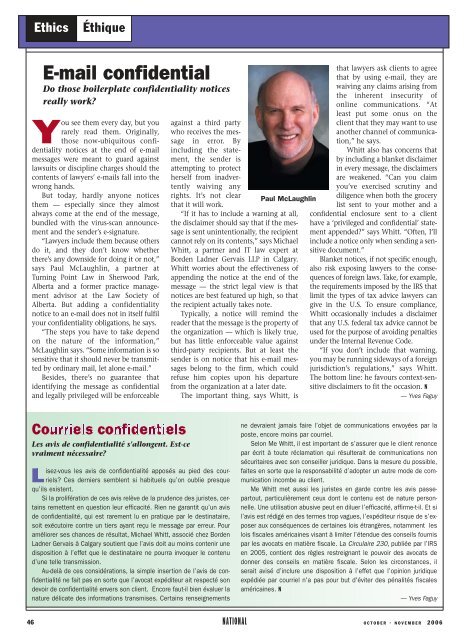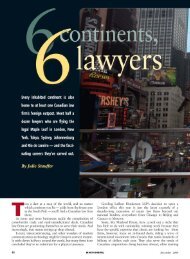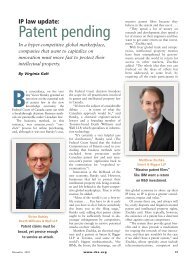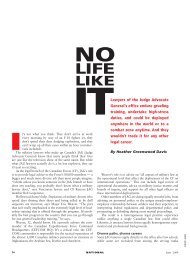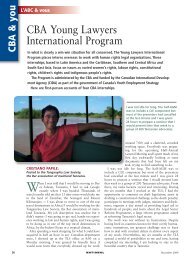ROBO-LAWYERS! ROBO-LAWYERS! - National
ROBO-LAWYERS! ROBO-LAWYERS! - National
ROBO-LAWYERS! ROBO-LAWYERS! - National
Create successful ePaper yourself
Turn your PDF publications into a flip-book with our unique Google optimized e-Paper software.
Ethics<br />
Éthique<br />
E-mail confidential<br />
Do those boilerplate confidentiality notices<br />
really work?<br />
You see them every day, but you<br />
rarely read them. Originally,<br />
those now-ubiquitous confidentiality<br />
notices at the end of e-mail<br />
messages were meant to guard against<br />
lawsuits or discipline charges should the<br />
contents of lawyers’ e-mails fall into the<br />
wrong hands.<br />
But today, hardly anyone notices<br />
them — especially since they almost<br />
always come at the end of the message,<br />
bundled with the virus-scan announcement<br />
and the sender’s e-signature.<br />
“Lawyers include them because others<br />
do it, and they don’t know whether<br />
there’s any downside for doing it or not,”<br />
says Paul McLaughlin, a partner at<br />
Turning Point Law in Sherwood Park,<br />
Alberta and a former practice management<br />
advisor at the Law Society of<br />
Alberta. But adding a confidentiality<br />
notice to an e-mail does not in itself fulfil<br />
your confidentiality obligations, he says.<br />
“The steps you have to take depend<br />
on the nature of the information,”<br />
McLaughlin says. “Some information is so<br />
sensitive that it should never be transmitted<br />
by ordinary mail, let alone e-mail.”<br />
Besides, there’s no guarantee that<br />
identifying the message as confidential<br />
and legally privileged will be enforceable<br />
Courriels confidentiels<br />
Les avis de confidentialité s’allongent. Est-ce<br />
vraiment nécessaire?<br />
Lisez-vous les avis de confidentialité apposés au pied des courriels?<br />
Ces derniers semblent si habituels qu’on oublie presque<br />
qu’ils existent.<br />
Si la prolifération de ces avis relève de la prudence des juristes, certains<br />
remettent en question leur efficacité. Rien ne garantit qu’un avis<br />
de confidentialité, qui est rarement lu en pratique par le destinataire,<br />
soit exécutoire contre un tiers ayant reçu le message par erreur. Pour<br />
améliorer ses chances de résultat, Michael Whitt, associé chez Borden<br />
Ladner Gervais à Calgary soutient que l’avis doit au moins contenir une<br />
disposition à l’effet que le destinataire ne pourra invoquer le contenu<br />
d’une telle transmission.<br />
Au-delà de ces considérations, la simple insertion de l’avis de confidentialité<br />
ne fait pas en sorte que l’avocat expéditeur ait respecté son<br />
devoir de confidentialité envers son client. Encore faut-il bien évaluer la<br />
nature délicate des informations transmises. Certains renseignements<br />
against a third party<br />
who receives the message<br />
in error. By<br />
including the statement,<br />
the sender is<br />
attempting to protect<br />
herself from inadvertently<br />
waiving any<br />
rights. It’s not clear<br />
that it will work.<br />
“If it has to include a warning at all,<br />
the disclaimer should say that if the message<br />
is sent unintentionally, the recipient<br />
cannot rely on its contents,” says Michael<br />
Whitt, a partner and IT law expert at<br />
Borden Ladner Gervais LLP in Calgary.<br />
Whitt worries about the effectiveness of<br />
appending the notice at the end of the<br />
message — the strict legal view is that<br />
notices are best featured up high, so that<br />
the recipient actually takes note.<br />
Typically, a notice will remind the<br />
reader that the message is the property of<br />
the organization — which is likely true,<br />
but has little enforceable value against<br />
third-party recipients. But at least the<br />
sender is on notice that his e-mail messages<br />
belong to the firm, which could<br />
refuse him copies upon his departure<br />
from the organization at a later date.<br />
The important thing, says Whitt, is<br />
that lawyers ask clients to agree<br />
that by using e-mail, they are<br />
waiving any claims arising from<br />
the inherent insecurity of<br />
online communications. “At<br />
least put some onus on the<br />
client that they may want to use<br />
another channel of communication,”<br />
he says.<br />
Whitt also has concerns that<br />
by including a blanket disclaimer<br />
in every message, the disclaimers<br />
are weakened. “Can you claim<br />
you’ve exercised scrutiny and<br />
Paul McLaughlin<br />
diligence when both the grocery<br />
list sent to your mother and a<br />
confidential enclosure sent to a client<br />
have a ‘privileged and confidential’ statement<br />
appended?” says Whitt. “Often, I’ll<br />
include a notice only when sending a sensitive<br />
document.”<br />
Blanket notices, if not specific enough,<br />
also risk exposing lawyers to the consequences<br />
of foreign laws. Take, for example,<br />
the requirements imposed by the IRS that<br />
limit the types of tax advice lawyers can<br />
give in the U.S. To ensure compliance,<br />
Whitt occasionally includes a disclaimer<br />
that any U.S. federal tax advice cannot be<br />
used for the purpose of avoiding penalties<br />
under the Internal Revenue Code.<br />
“If you don’t include that warning,<br />
you may be running sideways of a foreign<br />
jurisdiction’s regulations,” says Whitt.<br />
The bottom line: he favours context-sensitive<br />
disclaimers to fit the occasion. N<br />
— Yves Faguy<br />
ne devraient jamais faire l’objet de communications envoyées par la<br />
poste, encore moins par courriel.<br />
Selon Me Whitt, il est important de s’assurer que le client renonce<br />
par écrit à toute réclamation qui résulterait de communications non<br />
sécuritaires avec son conseiller juridique. Dans la mesure du possible,<br />
faites en sorte que la responsabilité d’adopter un autre mode de communication<br />
incombe au client.<br />
Me Whitt met aussi les juristes en garde contre les avis passepartout,<br />
particulièrement ceux dont le contenu est de nature personnelle.<br />
Une utilisation abusive peut en diluer l’efficacité, affirme-t-il. Et si<br />
l’avis est rédigé en des termes trop vagues, l’expéditeur risque de s’exposer<br />
aux conséquences de certaines lois étrangères, notamment les<br />
lois fiscales américaines visant à limiter l’étendue des conseils fournis<br />
par les avocats en matière fiscale. La Circulaire 230, publiée par l’IRS<br />
en 2005, contient des règles restreignant le pouvoir des avocats de<br />
donner des conseils en matière fiscale. Selon les circonstances, il<br />
serait avisé d’inclure une disposition à l’effet que l’opinion juridique<br />
expédiée par courriel n'a pas pour but d'éviter des pénalités fiscales<br />
américaines. N<br />
— Yves Faguy<br />
46 NATIONAL<br />
OCTOBER · NOVEMBER 2006


